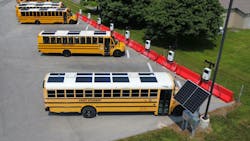New EV Charging Microgrid to Support Bus Electrification for Brooklyn Schools
New York utility Con Edison will work with EV charging infrastructure firm First Student to launch a demonstration project to support electrification of school buses in Brooklyn.
Through the project, a smart energy hub will be deployed to provide power for the project.
Additionally, the project will include a fleet of 12 electric school buses for Brooklyn schools. The buses topped with solar panels will replace diesel buses at First Student's Malta Street location.
The panels, along with solar arrays on the rooftop of the facility, will create energy generation, battery storage and power delivery.
“We are proving that a scalable, cost-effective microgrid is possible, and doing it using bus batteries that otherwise would be sitting dormant," said Alex Cook, chief engineer, First Student. "We learned from successful trials in multiple other deployments that combine our innovative charging infrastructure solution with unique energy storage options and dynamic load management software that can deliver a microgrid that is reliable and puts money back into the communities we serve."
The project is expected to strengthen local grids while storing and generating clean energy, and delivering the power at the required moments. A potential cost saver for ratepayers, the project also reduces the need for expensive construction-heavy projects and allows for quicker deployment speeds for future improvements, by using above-ground infrastructure.
First Student will deploy its First Charge solution for this project. The solution reduces construction costs by at least 30 percent and enables a more efficient deployment, even in winter or where trenching will be disruptive to residents and businesses.
The solution will also help upgrade the charging system for future deployments, adding flexibility and efficiency for vehicle electrification build outs. The project goes beyond the traditional vehicle-to-grid (V2G) technology for a new approach of power sourcing: Vehicle-to-Everything (V2X).
V2X includes the capacity to direct electricity delivery where it is needed. The smart energy hub will increase capacity, generating additional power for Con Edison, especially in summer months, when the buses are idle, and energy requirements increase, or during emergencies.
First Student has co-designed the system using advanced charging technologies to deliver megawatts of power, enough to power 5,000 houses for a year to Brooklyn. The project aims to help communities build a bridge to planned grid modernization while providing backup power to grids.
The smart energy hub is intended to also support emergency services and hospitals, including HVAC, power and lighting, in the future. First Student intends to transition 30,000 fossil-fuelled school buses to electric by 2035.
